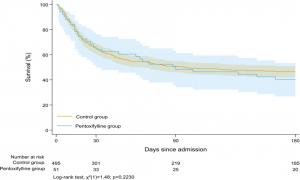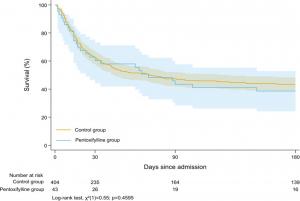Pentoxifylline Fails to Improve Survival in Alcohol-Associated Hepatitis with Kidney Injury
Researchers found no significant benefit in short- or long-term mortality outcomes with pentoxifylline use.
CHINA, June 26, 2025 /EINPresswire.com/ -- Severe alcohol-associated hepatitis (sAH) remains a highly lethal condition with limited therapeutic options. Characterized by rapid liver decompensation, sAH is often accompanied by acute kidney injury (AKI), a complication that substantially worsens prognosis. Corticosteroids are currently the only treatment shown to offer a modest short-term survival benefit in selected patients. Pentoxifylline, a phosphodiesterase inhibitor with anti-tumor necrosis factor alpha (TNF-α) properties, has been proposed as a potential alternative, especially for patients with contraindications to steroids or coexisting AKI. However, evidence supporting its efficacy has been inconsistent and regionally variable.To clarify the clinical utility of pentoxifylline in this setting, Idalsoaga et al. conducted a retrospective, multicenter registry study across 20 centers from eight countries. The study was published in eGastroenterology. The study included 525 patients diagnosed with sAH and AKI between 2009 and 2019. The primary outcome was all-cause mortality, with liver transplantation considered as a competing event. Main results include:
(1) Survival rates at 90 days were 46.2% in the pentoxifylline group versus 49.8% in the control group.
(2) Multivariable Cox regression showed that pentoxifylline use was not significantly associated with improved survival.
(3) Key predictors of mortality were: older age, higher MELD score at admission, and requirement for renal replacement therapy.
In addition, a secondary exploratory analysis focusing on patients with serum creatinine ≥1.5 mg/dL reaffirmed these findings. Again, pentoxifylline use did not improve survival at any time point, including 30, 90, or 180 days.
The results of this large real-world cohort study confirm that pentoxifylline offers no mortality benefit in sAH patients with concurrent AKI. This is consistent with previous studies and meta-analyses that have cast doubt on the efficacy of pentoxifylline in alcoholic hepatitis overall. Although pentoxifylline has shown renal protective effects in animal models and other clinical contexts (e.g., diabetic nephropathy, cardiac surgery), these mechanisms may not sufficiently counteract the complex inflammatory and hemodynamic disturbances seen in sAH with AKI. The high rates of multiorgan failure and infection-related deaths in this cohort highlight the multifactorial pathogenesis of mortality in these patients.
This study stands out for its large, diverse international cohort, and rigorous statistical approach. However, the retrospective design introduces inherent limitations such as missing data and potential confounding. Nearly half of the records lacked infection data, and the precise timing, dosing, and duration of pentoxifylline therapy were unavailable, which should be explored in the future.
The clear absence of benefit from pentoxifylline suggests a pressing need for novel therapies in sAH, particularly for those with AKI who are often excluded from corticosteroid treatment. Potential strategies may include: (1) Targeting specific inflammatory pathways (e.g., IL-1, gut-liver axis); (2) Microbiota-modulating interventions; (3) Plasma exchange; (4) Trials of combination therapy (e.g., corticosteroids + novel agents). Moreover, early detection of renal dysfunction and proactive infection management remain critical components of supportive care.
In conclusion, pentoxifylline does not improve survival in patients with sAH and AKI. These findings challenge current regional practices where pentoxifylline remains in use and underscore the need to re-evaluate its role in clinical guidelines. Future research should pivot toward novel, mechanism-based therapies to address the unmet needs of this high-risk population.
***
About eGastroenterology
eGastroenterology is a new, open-access, and open peer-reviewed BMJ Journal, which focuses on basic, clinical, translational, and evidence-based medicine research in all areas of gastroenterology (including hepatology, pancreatology, esophagology, and gastrointestinal surgery). eGastroenterology is now indexed by PubMed, Scopus, CAS, DOAJ, Dimensions, OpenAlex, ROAD, and COPE, with more to come!
For more information, please visit: egastroenterology.bmj.com and follow us on Twitter (@eGastro_BMJ).
Menghan Gao
eGastroenterology
+86 431 8878 2545
egastro|jlu.edu.cn| |egastro|jlu.edu.cn
Legal Disclaimer:
EIN Presswire provides this news content "as is" without warranty of any kind. We do not accept any responsibility or liability for the accuracy, content, images, videos, licenses, completeness, legality, or reliability of the information contained in this article. If you have any complaints or copyright issues related to this article, kindly contact the author above.
Medical Supplierz Showcases Cutting-Edge Medical Equipment from Verified Global Suppliers
Acupressure for Nurses Course Offers 6 CNEs from AHNA
Cook Travel Becomes Trailblazer, Accepting Bitcoin for Tours and Airline Tickets
Więcej ważnych informacji
 Jedynka Newserii
Jedynka Newserii

 Jedynka Newserii
Jedynka Newserii

Handel

Komisja Europejska chce wprowadzić ujednolicone przepisy dotyczące wyrobów tytoniowych. Europosłowie mówią o kolejnej nadregulacji
Ministerstwo Zdrowia opracowało nowy projekt przepisów wprowadzających kolejne zakazy dotyczące wyrobów tytoniowych – całkowitą eliminację e-papierosów oraz zakaz aromatów w woreczkach nikotynowych. Najprawdopodobniej w ciągu kolejnych dwóch–trzech lat Polska będzie musiała implementować nową dyrektywę dotyczącą wszystkich produktów tytoniowych, nad którym niebawem ma rozpocząć prace Komisja Europejska. Europosłowie mówią o ryzyku chaosu legislacyjnego, nadregulacji i wskazują na zagrożenia związane z proponowaną podwyżką akcyzy.
Konsument
Za trzy miesiące ruszy w Polsce system kaucyjny. Wątpliwości budzą kwestie rozliczeń i podatków

Zaledwie trzy miesiące zostały do startu systemu kaucyjnego w Polsce. Kaucje obejmą szklane i plastikowe butelki oraz puszki z napojami. To duża zmiana dla producentów napojów, sklepów i konsumentów oraz pośredniczących w zbiórce operatorów systemów kaucyjnego. Na razie przepisy są na tyle niedoprecyzowane, że budzą wiele wątpliwości w kwestii rozliczania podatków czy rozliczeń z operatorami. Producenci będą musieli płacić podatek od niezwróconych butelek, co zwiększy ich koszty.
Transport
Rośnie skala agresji na polskich drogach. Problemem jest nie tylko nadmierna prędkość, ale też jazda na zderzaku

Za kilka dni zaczynają się wakacje, czyli statystycznie najniebezpieczniejszy czas na drogach. Wśród głównych przyczyn takich zdarzeń na prostych odcinkach drogi są nadmierna prędkość i jazda na zderzaku. Zarządca autostrady A4 Katowice–Kraków w ramach kampanii „Nie zderzakuj. Posłuchaj. Jedź bezpiecznie” zwraca uwagę na zjawisko agresji na polskich drogach i przypomina, że bezpieczeństwo zaczyna się od osobistych decyzji kierowcy.
Partner serwisu
Szkolenia

Akademia Newserii
Akademia Newserii to projekt, w ramach którego najlepsi polscy dziennikarze biznesowi, giełdowi oraz lifestylowi, a także szkoleniowcy z wieloletnim doświadczeniem dzielą się swoją wiedzą nt. pracy z mediami.











.gif)

 |
| |
| |
|